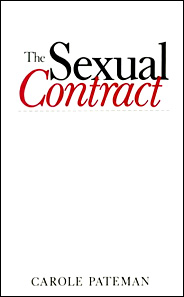| |
|
|
| |

I would like to thank the contributors for their generous acknowledgment of the anniversary of The Sexual Contract and for their commentaries. It is hard to believe that a quarter century has passed since my book was published, yet, as the contributors point out, a good deal has changed. But not everything looks different; for example, despite advances by women, men still monopolize the authoritative positions in politics, the judiciary, higher education, and the economy, while women still earn less than men and are more likely to be poor than men.
Continue Reading
ROUNDTABLE: Carole Pateman's The Sexual Contract Twenty-Five Years Later
Rereading a Classic Text
Anna Elisabetta Galeotti
Terms and Conditions
Robyn Marasco
The Misfortune of Silence
Jack Jackson
|
|
| |
|
|
|
| |
|
|
| |
KABIR TAMBAR |
|
| |
In a famous 1882 lecture at the Sorbonne, Ernest Renan highlighted a certain
obligation to forget, even a necessity for historical error, in the formation
of a nation. Renan constructed his argument on the basis of what he perceived
to be a straightforward empirical contrast apparent in his day. On the
one hand, the countries of Western and Southern Europe, such as France,
England, Germany, Spain, and Italy, had successfully—if through different
processes—established nations on the basis of carefully constructed and
selectively forgotten historical pasts. The Ottoman Empire, on the other
hand, encompassed an unwieldy motley of ethnic and religious groups, each
maintaining separate historical identities. In effect, the empire was a state
without an internally cohesive national body.
Read |
|
| |
|
|
|
| |
|
|
| |
ZRINKA STAHULJAK |
|
| |
The French nineteenth century was characterized by powerful intellectual
currents, sociology first among them, with history and medicine competing
for a place in the hierarchy. Each wrestled with the question of how to define
itself as a science against the backdrop of the rapidly growing authority
of positivist thought across the disciplines. Each strove to triumph as the
master discipline of the scientific study of the past and present. History and
medicine were in competition for legitimacy and dominance of epistemic
space and the political sphere, both of which were already strongly influenced
by Auguste Comte's positivism by mid-century. Nevertheless, they
also engaged in a dialectical relationship: history taught medicine (histoire
de la médecine) and medicine was a method to understand history (médecine
de l’histoire).
Read |
|
| |
|
|
|
| |
|
|
| |
SARA PURSLEY |
|
| |
Modern understandings of childhood and adolescence, as a number of scholars
have shown, are intertwined with histories of European colonialism. There
has been less focus on how these categories shaped and were shaped by global
processes of decolonization. This article contributes to such an inquiry, by
exploring how adolescence was mobilized in Iraq from its 1921 foundation
under British Mandate rule to the 1958 anticolonial revolution that toppled
the British-backed Hashimite monarchy. The historically peculiar mandate
system of semicolonial rule established by the League of Nations after World
War I was itself based on certain parallels between adolescence as a stage of
psychological and national life posited by European and American social scientists
at the turn of the century. Both colonial and anticolonial discourses on
adolescence in Hashimite Iraq were thus inevitably riven with the tensions, homologies,
and incommensurabilities of this temporal-spatial category, which
was simultaneously normalizing and constitutively conflictual.
Read |
|
| |
|
|
|

